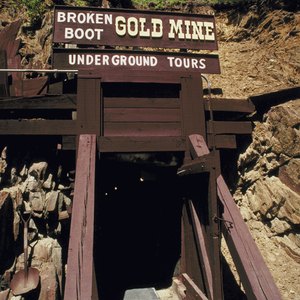
You can't dig for gold anywhere you choose. Individual owners control mineral rights on their own property, and the government controls the rights on public lands. You can, however, file a mining claim giving you the right to dig on public land. Filing a patented claim gives you added rights, but at the time of writing, none are available. Since 1994, Congress has maintained a moratorium on them.
Unpatented Claims
Since the 1800s, the federal government has allowed people to file claims on public lands. An unpatented claim gives the miner the right to explore the land for minerals -- originally gold, silver, mercury and copper, but in 1872, a new law approved claims for any valuable deposits. If the miner's exploration turns up something valuable, it's hers. You must pay an annual maintenance fee to the government if you want to retain your mineral rights.
Patented Claims
A patented claim gives the miner the right to both the minerals and the land itself. If the government approves a patent request, it transfers property title to the miner. At that point, the miner can explore, extract the minerals or build permanent mining structures and a home. He has the same rights as any property holder. He doesn't have to pay the maintenance fee, but local governments have the right to levy property taxes on the land.
Your Rights
Owning a claim isn't exactly the same as mineral rights. If you're a claim-owner, you can search for and mine metals and some nonmetallic minerals such as fluorspar, asbestos and gems. The claim doesn't entitle you to leasable materials, such as oil, natural gas, and coal, or to minerals such as sand, gravel, and stone. A patent, however, gives full ownership of the property, including the mineral rights to everything found underground.
Moving In
If all you have is an unpatented claim, the feds will not be happy if you make a permanent home on the surface. You can live on your claim, but only while you're mining, only in temporary shelter and only if there's no reasonable alternative available. Whatever structures you want to put up, you'll have to apply to the federal government for authorization. The process varies depending whether the land is controlled by the BLM or some other branch of government.
References
Resources
Writer Bio
A Durham, NC resident, Fraser has written about law, starting a business, balancing your budget and fighting evictions, among other legal and financial topics.
